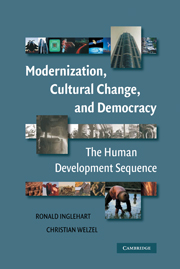Book contents
- Frontmatter
- Contents
- Dedication
- Acknowledgments
- Foreword by Hans-Dieter Klingemann
- Introduction
- PART I THE FORCES SHAPING VALUE CHANGE
- PART II THE CONSEQUENCES OF VALUE CHANGE
- 7 The Causal Link between Democratic Values and Democratic Institutions: Theoretical Discussion
- 8 The Causal Link between Democratic Values and Democratic Institutions: Empirical Analyses
- 9 Social Forces, Collective Action, and International Events
- 10 Individual-Level Values and System-Level Democracy: The Problem of Cross-Level Analysis
- 11 Components of a Prodemocratic Civic Culture
- 12 Gender Equality, Emancipative Values, and Democracy
- 13 The Implications of Human Development
- Conclusion: An Emancipative Theory of Democracy
- Bibliography
- Index
11 - Components of a Prodemocratic Civic Culture
Published online by Cambridge University Press: 05 September 2012
- Frontmatter
- Contents
- Dedication
- Acknowledgments
- Foreword by Hans-Dieter Klingemann
- Introduction
- PART I THE FORCES SHAPING VALUE CHANGE
- PART II THE CONSEQUENCES OF VALUE CHANGE
- 7 The Causal Link between Democratic Values and Democratic Institutions: Theoretical Discussion
- 8 The Causal Link between Democratic Values and Democratic Institutions: Empirical Analyses
- 9 Social Forces, Collective Action, and International Events
- 10 Individual-Level Values and System-Level Democracy: The Problem of Cross-Level Analysis
- 11 Components of a Prodemocratic Civic Culture
- 12 Gender Equality, Emancipative Values, and Democracy
- 13 The Implications of Human Development
- Conclusion: An Emancipative Theory of Democracy
- Bibliography
- Index
Summary
Rival Theories of Political Culture
From the start, scholars of political culture have claimed that the functioning and survival of democratic institutions at the system level is closely linked with individual-level value orientations (Lerner, 1958; Almond and Verba, 1963; Eckstein, 1966). Thus, the notion of a population-system linkage that ties political institutions to mass tendencies in individual-level values is essential to the entire literature on political culture. From this perspective, the fate of a political system is largely determined by its people's political attitudes and value orientations. Aristotle in the fourth century b. c. and Montesquieu (1989 [1748]) in the eighteenth century argued that different forms of government reflect the kinds of virtues that prevail among a people. Awareness of this insight reemerged in explanations of the Nazi takeover in Weimar Germany, with many observers concluding that this disaster could be traced to the fact that Weimar was a “democracy without democrats” (Bracher, 1971 [1955]).
Starting from the premise that mass orientations were crucial to democracy, Almond and Verba (1963) launched the first comparative empirical survey of the mass attitudes linked with the stability and functioning of democracies. They concluded that a healthy mixture of “subject orientations” and “participant orientations” was conducive to a “civic culture” that helps democracies to flourish. Subsequent comparative empirical studies emphasized the importance of individual-level attitudes and values, in sustaining democratic institutions at the system level (among others, see Barnes, Kaase, et al., 1979; K. Baker et al., 1981; Putnam, 1993; Klingemann and Fuchs, 1995; Inglehart, 1997; Pharr and Putnam, 2000; Dalton, 2001; Norris, 2002).
- Type
- Chapter
- Information
- Modernization, Cultural Change, and DemocracyThe Human Development Sequence, pp. 245 - 271Publisher: Cambridge University PressPrint publication year: 2005
- 1
- Cited by



